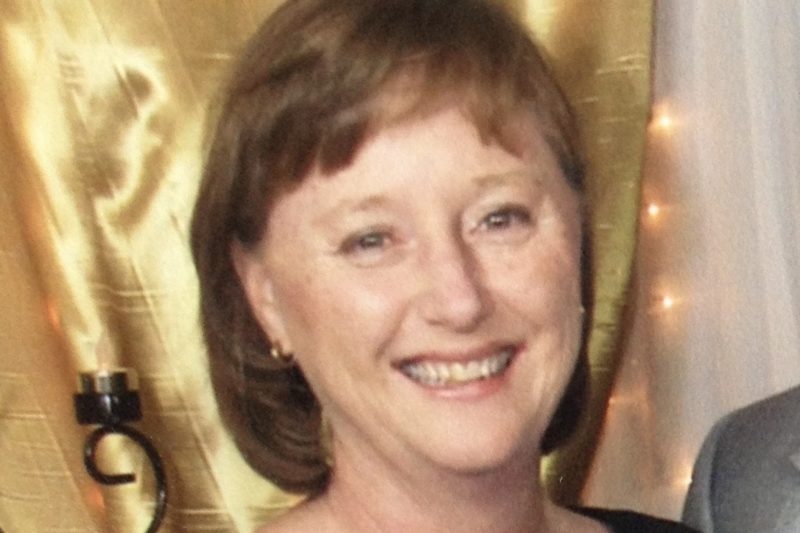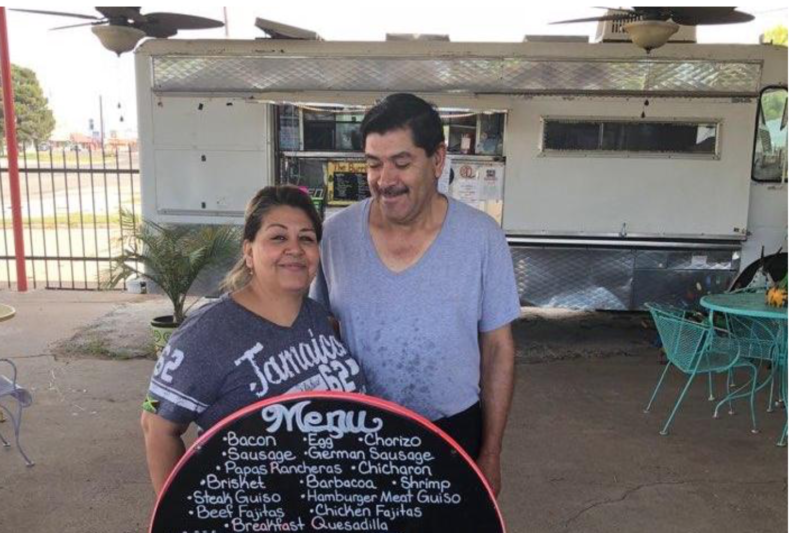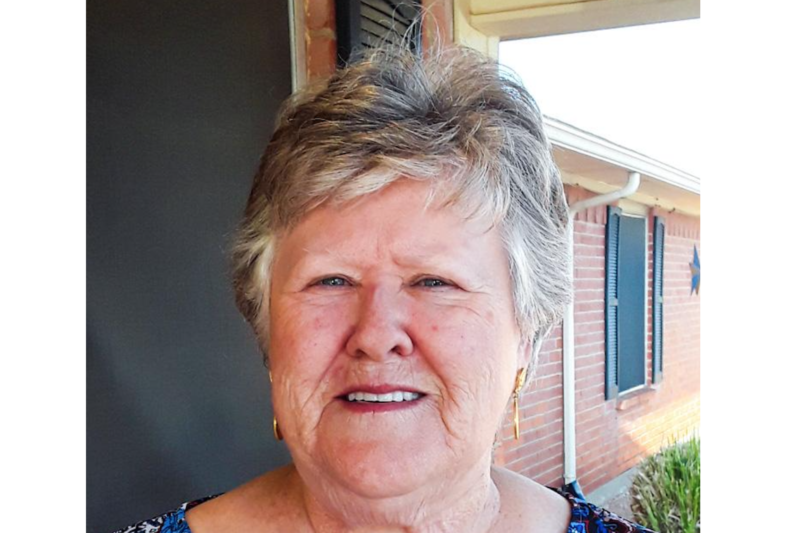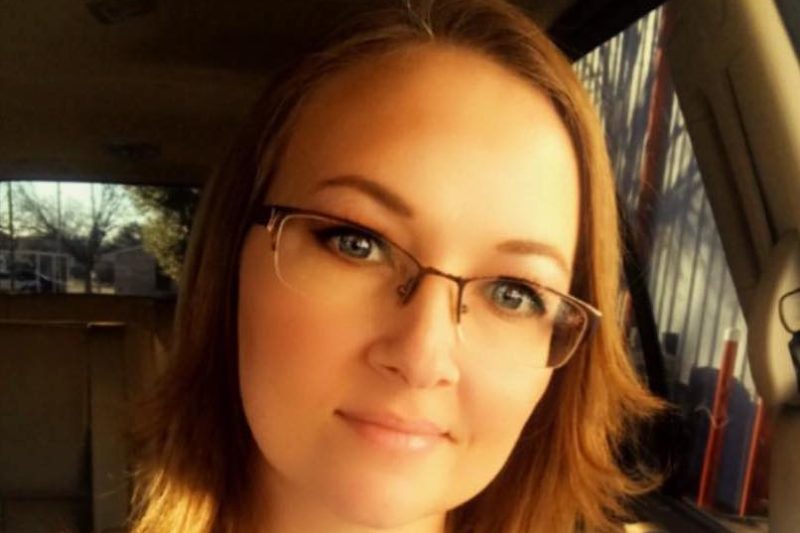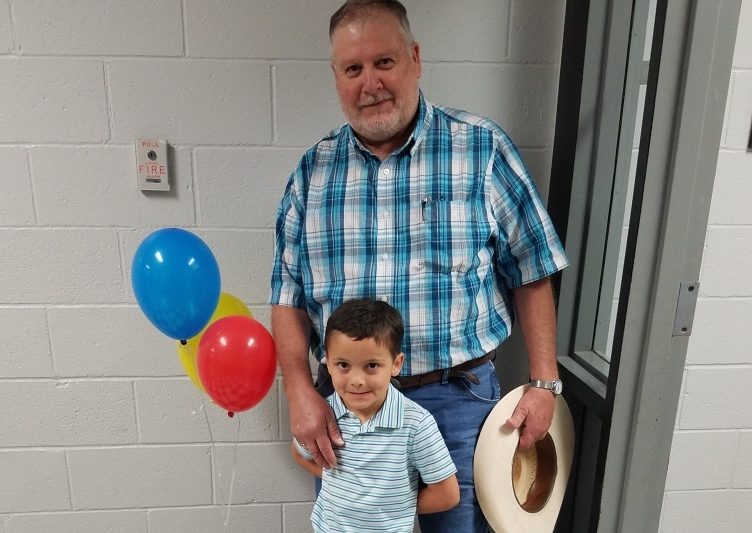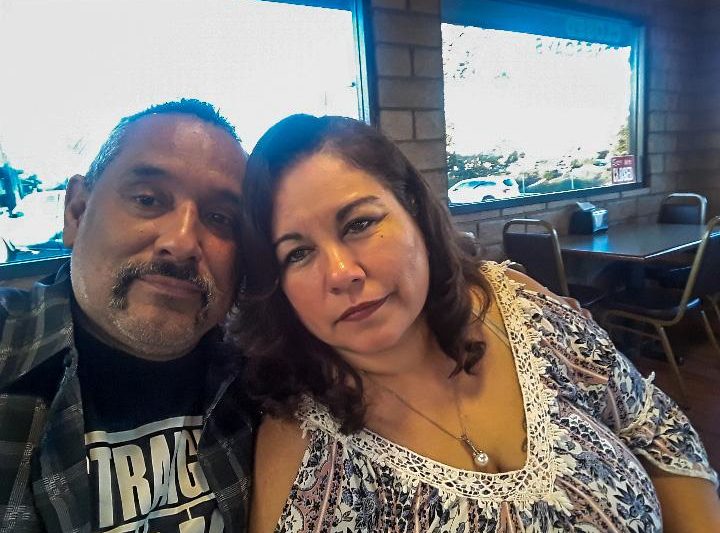Voices of Eden: Texas Town Looks to Future in Time of COVID-19
By Hope Lenamon, Cat DeLaura, Aimée Knight, Tyler Lewis and Nataleah Small
Reporting Texas
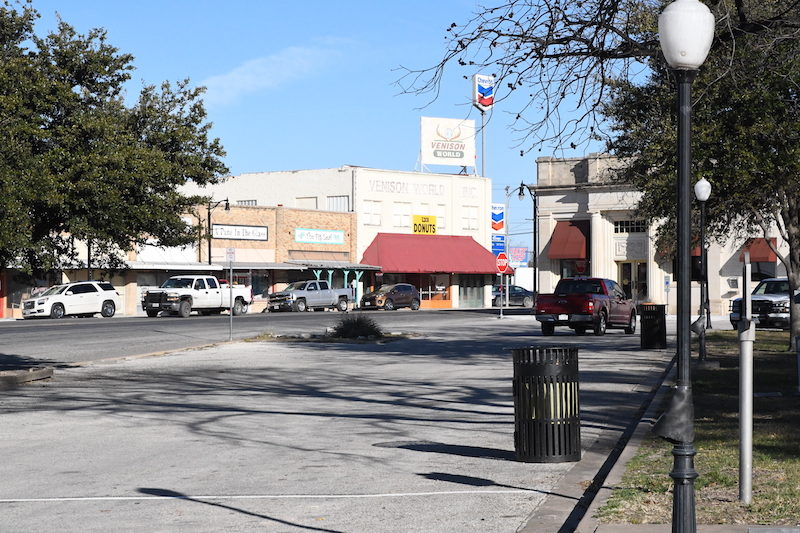
Downtown Eden, Texas, on Feb. 28. Tyler Lewis/Reporting Texas
Originally published April 7. Scroll down for updates.
EDEN — This small Central Texas town sits at the intersection of U.S. Highways 83 and 87, close to the bullseye of the state. Almost 3,000 people live in a near-perfect encapsulation of rural life: a main street, a historic downtown, a single stop light, and a few restaurants and businesses where owners greet locals by name.
Eden and other rural areas that were once mainstays of the Lone Star State are falling victim to increased urbanization. People move to cities for better jobs, education, housing and recreational opportunities. As urbanization continues, it becomes increasingly difficult for rural towns to remain viable places to live; yet some people still stay.
On Feb. 28, Reporting Texas traveled to Eden, 160 miles northwest of Austin, for those very reasons. We wanted to talk to an often-overlooked population about life in a small town. We walked around the community and spoke to local government officials, business owners, religious leaders, town historians and school administrators. We learned of wind farms going up, church attendance going down, a school district trying to provide students a ticket to somewhere better off, a privately owned ICE detention center reopening, and a century-old newspaper refusing to die. Leaving town that night, we planned on telling the story of a town fighting for survival.
At the same time, another story of fight and survival was sweeping the globe in the form of COVID-19. Dallas and Tarrant county officials announced the first two presumptive positive COVID-19 cases in Texas on March 10. Less than a month later, more than 7.200 confirmed cases and 140 fatalities have been reported in the state.
Concho County, where Eden is located, had no confirmed COVID-19 cases as of April 6. Just 40 minutes away, neighboring Tom Green County had 21 confirmed cases as of April 5. All those cases are in San Angelo, a place many Edenites told us they commute to for work and recreational purposes. As the virus continues to spread from city centers to the suburbs, it seems only a matter of time before it hits Texas’ rural areas.
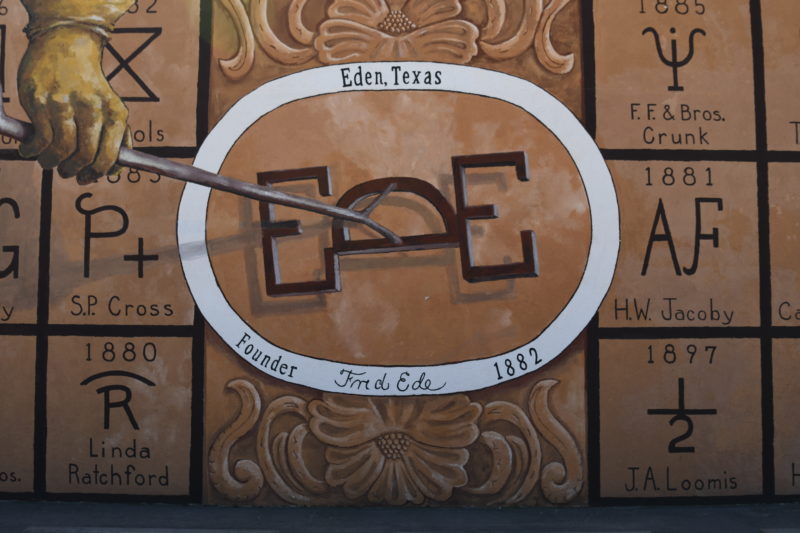
A mural in Eden, Texas. Tyler Lewis/Reporting Texas
Unlike larger cities across the state, Eden has not issued a shelter-in-place order for the town’s residents. However, in accordance with the March 31 announcement from Gov. Greg Abbott, all non-essential businesses have been closed and restaurants have moved to a to-go only format. Students in the Eden Consolidated Independent School District left for spring break on March 6. Administrators extended the break, and ultimately, per orders from Abbot, the district announced on March 31 it would close through May 4.
According to the city’s business directory, Eden has one grocery store, or two if counting the Family Dollar, and three convenience stores. It has a 16-bed hospital that also houses the town’s pharmacy and rehab center. An outbreak could quickly overwhelm local resources.
How is Eden dealing with and preparing for COVID-19? Can residents pivot from their day-to-day lives and businesses to online and distanced formats? Can businesses even survive? Will the town’s resources be sufficient if this continues for weeks longer? Months?
We reached out to people we spoke to back in February and new contacts we have since made to shed light on their situation and answer these questions. We will post Eden’s stories as they develop.
— Hope Lenamon
Update April 11, 7:30 a.m.:
Confirmed cases of COVID-19 continue to rise in rural America. As of April 8, more than two-thirds of rural counties have confirmed at least one case, and the case rate in those areas is more than double what it was the previous week, according to The New York Times. The first case in Concho County was reported on April 10. On the same day, Tom Green County reported 32 confirmed cases and one fatality, and McCulloch County reported two cases.
— Cat DeLaura
Update April 24, 1:25 p.m.:
Most Texas voters believe the novel coronavirus can be contained enough for a return to normal activities within a few months, a University of Texas and Texas Tribune poll shows. Two thirds of those polled consider the pandemic “a serious crisis” and most are deeply concerned about the economy, unemployment and the health care system.
— Aimée Knight
Update April 25, 8:05 a.m.:
Gov. Greg Abbott is expected to issue an executive order Monday that will allow the staged reopening of Texas businesses after his current stay-home order expires April 30. Openings will vary by county depending on factors including number of confirmed cases and death rate. As of April 25, Concho County has one confirmed case.
— Aimée Knight
Update May 5, 8:15 a.m.:
On May 1, Texas’ stay-at-home order expired, allowing certain businesses — including retail stores, restaurants and libraries — to reopen. In Eden, business owners have differed over whether to open their doors. Schumann’s clothing store reopened their Eden and San Angelo locations on Friday with limited hours and social distancing guidelines put in place. On May 5, the Eden Public Library reopened. The City Limits Cafe is continuing to offer to-go service only. A spike in cases in a nearby county made café co-owner Albert Ramirez nervous about reopening, he said.
Concho County still has one confirmed case, but neighboring Mason County has reported 24 cases and has 100 tests still pending, a spike that was likely due, in part, to a recent in-person city council meeting in the city of Mason, according to KXAN.
— Cat DeLaura
Kit Hall, kindergarten teacher, Eden Elementary School
Published May 14.
Before the coronavirus pandemic hit, Kit Hall loved seeing see her students out and about in the community. “They’ll see you in the grocery store, and they’re so excited that you were at the grocery store, or at the football game … or at church,” Hall said.
That ended when the town’s schools closed in March and the rhythms of daily life abruptly changed. Today, Hall rarely sees her students, current or former, in person and social-distancing has replaced the hugs Hall once liked to bestow.
“I haven’t been to the grocery store very much,” she said. “I haven’t been in places to see kids because I’m trying to respect the fact that I need to go out only when I really need to go out.”
An Eden native, Hall left town in 1980 to attend Southwest Texas State University. She returned to Eden, married her high school sweetheart and taught kindergarten from 1984 to 1989 before the couple moved away. After they returned in 2003, Hall taught family consumer science to students in grades 7 to 12 for 16 years. She returned to teaching kindergarten in 2019.
Hall, 57,has found the transition to distance-learning challenging. “So much of what we do with kindergarten is face to face and through activities and games,” she said. Hall has changed how she presents information and keeps students interested.
Like other teachers in Eden, Hall makes up study packets parents can pick up every two weeks at a designated area in front of the school where social distancing is in effect. In addition, uses Flipgrid, an online learning platform, to post lessons and videos for her students.
With the end of the semester rapidly approaching, Hall said kindergarten graduation will take place in a new format. Instead of the traditional gathering of family and friends, students will participate in a car parade through the streets of Eden on May 20.
Hall looks forward to the day when she can reunite with her students.
“God willing … I can’t wait to see them walk up as big, old first-graders and give them a hug or a high five or a handshake and tell them how proud I am of how they’ve done,” Hall said.
-Nataleah Small
Cynthia Gonzalez, co-owner, The Burrito Lady
Published May 8.
Traffic on U.S. Highway 87 South into Eden is lighter than usual in these pandemic days, said Cynthia Gonzalez, but the food-truck business she runs with her husband, Roger, is booming.
Twenty-year residents of Eden, Cynthia, 51, and Roger, 61, opened The Burrito Lady six years ago. Two years ago, they changed locations, transforming a former Texaco gas station into an eatery that today offers 70 burrito types and the option to dine indoors or out.
While Gov. Greg Abbott’s stay-at-home order, issued on March 16, made dining-in an impossibility, Edenites still had to get their food somewhere, so the Gonzalez’s takeout business has flourished.
That’s partly due to major Eden employers like the windfarms that have established themselves on the outskirts of town in recent years. Hungry workers rely on Cynthia and Roger’s burritos to feed them amid COVID-19 shutdowns.
Cynthia wishes there could be doubles of Roger and her to help share the workload. “We are extremely busy right now, goodness gracious,” she said.
For the most part, The Burrito Lady’s loyal customers have been understanding of social-distancing guidelines. “I did have one gentlemen who was upset,” Cynthia said, but “it’s either listen to the rules or we will have to shut down.”
Cynthia has tried to make the business more customer-friendly by allowing the workers to text and call in orders the night before. “I feel like everybody’s momma because I’ll bag their lunch [with] their name on it and have it ready for them,” she said.
—Tyler Lewis
Hazel Medders, director, Eden Community Food Pantry
Published May 6.
The Eden Community Food Pantry has experienced a major increase in business since the COVID-19 outbreak began.
Hazel Medders, director of the pantry, credited the boom to Edenites working in surrounding towns, including San Angelo, being furloughed or laid-off. Because of the surge in foot traffic, it’s been hard to keep up with demand, especially financially, she said.
“Even our regional food bank has started running short of items, and we have had to go to distributors to buy [things] ourselves,” Medders said.
Medders, 72, has served as the pantry director for a little over a year. She and her husband, who was born in Eden, relocated from Houston over 50 years ago after he suffered an oil field injury.
Like most food banks, the food pantry is a donation-driven business that doesn’t receive any state funding. Luckily, area residents have stepped up with help for Medders.
When the pantry posted its need for 100 pounds of pinto beans, Medders said “There was a restaurant in San Angelo that called me and said they had the beans. It was through God’s intervention. It had to be. We ended up with 300 pounds of beans.”
Medders is accustomed to seeing and serving many older residents of Eden, but the pandemic has affected younger residents, as well. Medders said it’s usually grandmothers raising grandchildren that she sees the most, but she’s also “seeing people come into the food bank who never thought they would have to ask for help.”
Medders’ recent efforts on behalf of the food pantry included raising funds by hosting a bake sale to make the facility wheelchair accessible. The surge in business has forced her to put the initiative on pause.
“I feel like the smaller food banks are being overlooked,” Medders said. “We need help.”
-Tyler Lewis
Kayla Clarke, Nurse, Concho Health and Rehabilitation Center
Published May 5.
Life in a time of pandemic has become even busier than usual for Kayla Clarke. For eight years, the 36-year-old licensed vocational nurse has worked long hours at the Concho Health and Rehabilitation Center. On top of that, she now finds herself playing the role of teacher to her four children since they shifted to homeschooling after Eden’s schools shut down in March.
“That’s definitely been an adjustment figuring out how that will work,” Clarke said. “But I think we’ve got the hang of it now.”
Her kids range in age from 6 to 17. While the older two girls have adjusted fairly easily to online classes and schoolwork, the younger two boys insist Clarke sit down and work with them. And of course, all of them are adjusting to being stuck at home.
“I know the kids are wanting to get out and do stuff,” Clarke said. “So that’s a little bit hard to explain to the younger ones why they can’t go to [their church] youth [group] or go to the store with me.”
Meanwhile Clarke works 6 p.m. to 6 a.m. shifts at the nursing home, where facilities are now closed to anyone but staff and residents. New protocols require the staff to have their temperatures taken and answer questions about their health each day before they’re allowed to enter.
All nurses, as well as its 44 residents, are required to wear masks, a policy helped by a large community donation of homemade masks. Meanwhile, residents are encouraged to stay in their rooms as much as possible. “It seems like every day something changes,” Clarke said. “Policies at work change all the time.”
Around Eden, Clarke said, people do their best to social distance, but it isn’t easy.Whether you go to the Post Office or the grocery store, you’re bound to run into someone you know. “It’s hard not to sit and visit for a long time,” Clarke said.
As the state begins to reopen under orders from Gov. Greg Abbott, Clarke said she hopes it will be done slowly. “As much as we want to get out and about, we need to be smart about it,” she said.
Clarke hopes life in the current pandemic will change behavior to some degree, encouraging people to think twice about going out if they’re not feeling well. They “will save that grocery trip for a couple days, or not visit people, and just be more aware of that aspect of it,” Clarke said.
-Cat Delaura
Skeet Rogers, manager, Southwestern Wool and Mohair
Published May 5.
Skeet Rogers, manager of Southwestern Wool and Mohair, spends his days conducting sales of livestock feed and ranch supplies. So far, he’s managed to avoid much of the coronavirus pandemic’s disruption to daily life.
“Everything is business as usual for us,” Rogers said. “We can’t shut down if we’ve still got livestock to feed. These animal still got to be taken care of.”
Serving ranchers from Concho, Menard and McCullough counties, Southwestern Wool and Mohair sells horse, cattle and sheep feed along with hayseed for ranchers to plant. Rogers, 64, has worked at the company’s warehouse just east of Eden’s city limits for 20 years. With a minimal workforce of just him and a secretary, Rogers credits much of the business’s resilience to ranchers’ continued need to keep livestock healthy.
Rogers calls neighboring Menard County home and commutes 22 miles to work each day, six days a week. He recognizes his business is lucky to remain relatively untouched by mandated closings and has noticed Edenites taking precautions to slow the spread.
“The bank has changed their hours and everybody has a little plexiglass shield up in front of their stall,” he said. Traffic along Highway 83 slowed for a couple weeks. Generally, Rogers says, living and working in a rural area affords residents more freedom than those living in the city, since “we’re more spread out here.”
“I’ve got a kid who lives in Kyle down there, and she’s been stuck in her house for four weeks now,” Rogers said. “I know it’s tougher for those in the city.”
Unlike the supply chain issues many grocery stores face, Rogers says his suppliers in Abilene, San Angelo and Amarillo continue to deliver inventory as they always have. “My animal products come out of San Antonio,” he said, “and it’s still next-day delivery.”
Rogers thinks Gov. Greg Abbott’s plans to reopen some Texas businesses as of May 1 is needed to get people back to work. But restrictions mandated for restaurants to limit their diners to 25% occupancy will have a greater impact on rural restaurants, he says. “With these little restaurants here,” Rogers said, “that’s about six or seven people.”
Although he’s carrying on as usual, Rogers’ main concern is for his customers. With restaurants closed and the demand for beef declining, “the price of beef has dropped really bad. That stuff’s fixing to get pretty tough.”
-Aimée Knight
Sylvia Castillo, co-owner, Morocco Cafe
Published April 30.
Sitting next to an abandoned motel, Morocco Cafe is filled with wooden and white foldable tables. From burgers and seafood to soul food and Tex-Mex, Morocco’s menu is eclectic.
Sylvia Castillo, 48, and her husband, José Castillo, 51, bought the business from José’s mother a decade ago.
The Morocco Café has experienced a steady decline in business since Gov. Greg Abbott issued a stay-at-home order on March 16, Castillo said. Before the stay-at-home order, the majority of the restaurant’s business came from travelers passing through town.
“Sales have decreased by quite a bit, but our locals are keeping us afloat,” Castillo said, “Everybody has to eat, right?”
The restaurant has encountered roadblocks with having produce shipped in, but “what we can get, we get,” Castillo said. So far their menu hasn’t been modified during the pandemic because the couple anticipated the ramifications of COVID-19 by overstocking on many items, including meats and eggs.
“We are kind of making do with what we have and making good of a bad situation,” Castillo said.
The couple is working hard to keep the cafe operating, Castillo said. Castillo’s husband arrives most mornings at 4:30 a.m. to ensure that local wind farm employees have a place for breakfast.
Burgers that range in price from $7.19 to $10.99 have been the top-selling dish for Morocco’s during the pandemic. Castillo said it’s because everyone is resorting to eating in their cars. Her husband attributes it to being the best burgers in town.
In a small town, everyone knows everyone, and not interacting with customers who they know and love has been difficult for Castillo. “Everybody has looked out for [one another],” she said. The restaurant has started delivering to older residents, she added.
“Right now, I think we will be OK,” Castillo said. “We will take it one step at a time, one day at a time.”
-Tyler Lewis
Emily Hemmeter, senior, Eden High School
Published April 27.

Emily Hemmeter. Courtesy Emily Hemmeter.
The State Leadership Conference for Texas chapters of Family, Career and Community Leaders of America originally was scheduled for April 2-4, and Emily Hemmeter was supposed to be there.
At the conference, Hemmeter, a senior at Eden High School, and her team would have presented their “Chapter in Review” display — a six-foot-long photo collage showcasing everything the group had done within their community over the last year — for a chance to advance to the National FCCLA Leadership Conference in Washington, D.C.
“It really meant a lot to us,” Hemmeter, 17, said. “We worked super hard on it and put countless hours into it, then we didn’t even get to present it at state.”
Because of COVID-19 concerns, the in-person competition was canceled, and winners were instead chosen based on scores from regional competitions in March. Under this new system, Hemmeter and her team placed third and did not qualify for nationals.
Since the cancelation of school and extracurricular activities, Hemmeter said her days look very different than they did a few months ago. Like many students in small towns, she was involved in just about every available extracurricular activity available to her. In addition to FCCLA, Hemmeter participated in basketball, cross country, track, National Honor Society and spent time volunteering in the community.
Now, Hemmeter stays up late, wakes up around 10 a.m. and tries to get schoolwork done. Then she tries to find something to do, which could be anything from puzzles and watercolor painting, to making friendship bracelets and helping her parents paint their house.
“Sometimes I’ll drive around for about two hours just to pass time,” Hemmeter said, “because I am running out of things to do.”
Another thing Hemmeter cannot do like normal: see her friends.
“Last night we actually got to social distance (visit) in our high school parking lot for a little while,” Hemmeter said.
She said she and her friends have not really been allowed by their parents to hang out, which makes her feel like Eden is following social distancing rules “pretty good.” She does know a few people who are not adhering to the guidelines.
-Hope Lenamon
Albert Ramirez, co-owner, City Limits Cafe
Published April 27.

Albert and Marina Ramirez. Courtesy Albert Ramirez.
Looking out and seeing the totally empty dining room of Eden’s City Limits café, serving “the finest in Mexican and American food,” is the hardest part for owner Albert Ramirez.
“We can’t do anything about it,” Ramirez, 52, said. “It’s been slow here just like everywhere else.”
He and his wife, Marina, opened the cafe in 2004 while living in nearby San Angelo. They both had years of experience in the food industry and decided that if they ever found a good location they would try to open their own restaurant. They saw a newspaper ad for a building in Eden and moved there for 12 years after they opened the cafe. They recently moved back to San Angelo, however, after their kids graduated from high school and now make the 35-minute commute every day.
The cafe serves a selection of moderately priced classics: pancake and waffle specials in the morning and their popular hamburgers, enchiladas and quesadillas in the afternoon and evening.
When Gov. Greg Abbott ordered residents statewide to stay at home starting April 2, the Ramirezes were forced to close their dining room and only offer food to-go. Business has declined dramatically, Ramirez said.
“We had a lot of travelers come through all the time, but of course with everything happening our travelers disappeared.” He estimates nearly 75% of their business was from people driving through town. Now the customer base is mostly people who live in town or folks working on the wind turbines going up just outside the city limits.
“We’re swimming, but we haven’t drowned yet,” he said.
He’s never required a large staff to run City Limits, so fortunately he didn’t have to lay off anyone. One woman had to quit when the schools closed and she needed to stay home with her kids. Prior to the pandemic, Ramirez would also hire some of the women who work at the detention center for part-time shifts, but he and his wife haven’t needed any extra help since they closed the dining room. Currently only he, his wife and one other woman keep the cafe running.
Ramirez knows they’re not the only people suffering. “I’m just ready for it to be over,” he said.
-Cat DeLaura
Hallie McCulloch, senior, Eden High School
Published April 26.
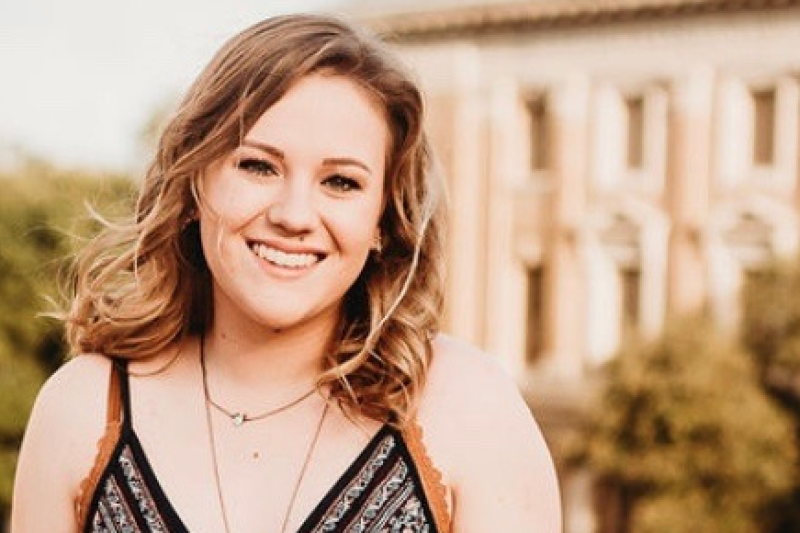
Hailey McCulloch. Courtesy Hailey McCulloch.
An extra week of spring break thrilled Hallie McCulloch back in March, but the novelty vanished by the time Gov. Greg Abbott closed Texas schools for the year on April 17.
“We were kind of like, ‘Woohoo, two weeks for spring break sounds like a deal,’” McCulloch, a senior at Eden High School, said. “As it got closer to being the end of our extended break, we got nervous. Then they started canceling everything, and it just keeps on getting pushed back.”
Before school was canceled, McCulloch, 18, participated in band, One Act Play, poetry and history University Interscholastic League events, played golf and was a member of Family, Career and Community Leaders of America — a leadership organization focused on developing life skills. Her golf season was canceled after the second tournament, and the state conference for FCCLA, which would have given the team an opportunity to advance to a national competition, also was canceled.
McCulloch acknowledged perceptions of rural Texans’ resisting social distancing measures, but she said Edenites are abiding by social distancing rules better than she had expected. However, she still sees people on social media organizing holiday celebrations and cookouts. She added the town is lucky to have a Lowe’s Market stocked with essentials but that going to San Angelo for supplies and services not available in Eden remains necessary.
“My mom recently broke her wrist, so we’ve been having to run into San Angelo for doctors appointments, because anything that’s too big for Eden you have to go to San Angelo for,” she said.
In addition to classes and extracurricular activities, stereotypical senior events like the academic banquet, prom and jersey retirements, where seniors in various sports ceremoniously retire their jerseys at the end of their seasons, were canceled. For McCulloch, this was especially hard because she grew up watching both her older sisters participate in those milestone celebrations.
“Being able to have none of that, and it being questionable about what our graduation is going to be is really disappointing,” McCulloch said.
McCulloch plans to attend Texas Tech University in the fall and study family and consumer science education with a goal of becoming a high school teacher. Though college will take her away from her hometown for now, her roots will always be planted in Eden.
“I think I’ll probably try to teach in a little bit of a bigger district,” McCulloch said, “but I wouldn’t be surprised if I ended up teaching back at Eden.”
-Hope Lenamon
Shay Avants, athletic director and special education director, Eden High School
Published April 24.
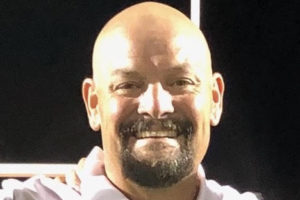
Shay Avants. Courtesy Shay Avants.
Eden High School teachers and faculty members had to make a major pivot to the online format when classes resumed on March 23 after two weeks of spring break in response to the COVID-19 pandemic.
The pandemic also had a significant impact on the school’s sports teams, which had performed well throughout the school year, said Shay Avants, athletic director and special education director for the Eden Consolidated Independent School District.
“We had a very successful football team this year. We had a very successful basketball team,” Avants, 43, said. “We were really looking forward to a successful track season, and we just didn’t get that chance.”
Now that schools are physically closed, all athletic facilities, such as the track and football field, basketball gym and weight room, are closed as well, Avants said. Student athletes were given workout plans to follow at home, but there is no way to monitor student activity, Avants added.
“I’m not going to try to do a virtual workout with them because most kids aren’t going to have the equipment needed to do something like that,” Avants said.
As the director of special education, Avants is working to provide accommodations and resources to help students complete online assignments and homework. Accommodations include oral exam administration and inclusion minutes, where students receive guidance and support from their general education teacher and a special education teacher.
“We’ve got a relatively, decently large special (education) population,” Avants said. “There is really no wiggle room as far as special (education) services for children. So, we (are) trying to come up with creative ways to meet the needs of our special (education) kids.”
Using the online meeting platform Zoom, Avants hosts five meetings every day with special education students to assist them with schoolwork.
“We really try to help students out as much as we can,” Avants said. “And those meetings are open … if a general (education) student needed the information or needed some help, then we would invite them into the meeting as well.”
-Nataleah Small
Craig Pfluger, economic development coordinator, City of Eden
Published April 20.

Craig Pfluger and wife Brenda Pfluger. Courtesy Facebook.
Eden’s economic future looked encouraging just two months ago, according to Craig Pfluger, the town’s economic development coordinator.
At the end of February, with spring break traffic on the not-too-distant horizon, Eden restaurants and businesses were anticipating their annual influx of customers. Federal grant money had recently given the central square’s sidewalks, storefronts and streetlamps a fresh coat of paint, and dilapidated warehouses just south of town had new roofs, water, sewage and electrical infrastructure. The development board was hopeful the refurbishments would attract businesses.
About 10,000 cars a day passed through Eden’s primary intersection, where U.S. Highways 83 and 87 meet, before the pandemic, Pfluger said, and that traffic fueled the small town’s economy. Drivers traveling from Lubbock, Midland or San Angelo to larger cities like Houston, Austin, San Antonio or Corpus Christie are likely to pass through Eden, he said.
Eden’s once traffic-laden roads are quiet now, and its sidewalks almost empty. As economies across the country have sputtered and slowed to a near halt, so too has Eden’s – and, for Pfluger, the outlook has turned bleak.
“I’m way too young to have lived through the Depression,” Pfluger, 67, said, “but I suspect it’s going to be similar.”
From a statewide perspective, Pfluger said, the biggest economic hurdle is the falling price of oil. Eden is lucky it’s not in the middle of an oil patch like some West Texas towns, “where everybody’s losing their jobs,” Pfluger said, “but it still affects us all.”
Although he’s not sure how many Edenites have lost income, Pfluger is skeptical many have made the transition to working from home. “We don’t have very dependable internet service,” he said. “There’s no fiber. Most people have wireless internet but it is not very good.”
Agriculture is a “major part” of Eden’s economic base, Pfluger said. A rancher himself, Pfluger said his one employee is still working (because “social distancing’s pretty easy on the ranch”), but his main problem is plummeting demand for beef. With restaurants closed and people out of jobs, “nobody’s going to be buying fine cuts of beef right now,” he said.
Eden suffered a significant economic hit in 2017, when the privately owned Eden Detention Center closed down and, as the town’s biggest employer, took 270 jobs with it. Pfluger thinks today’s slowdown could be worse.
“That was a more localized economic situation,” he said. “I think the economic impact of this, and trying to regrow the economy, is going to be with us likely for years.”
—Aimée Knight
Carolyn Moody, curator, Don Freeman Memorial Museum
Published April 16.
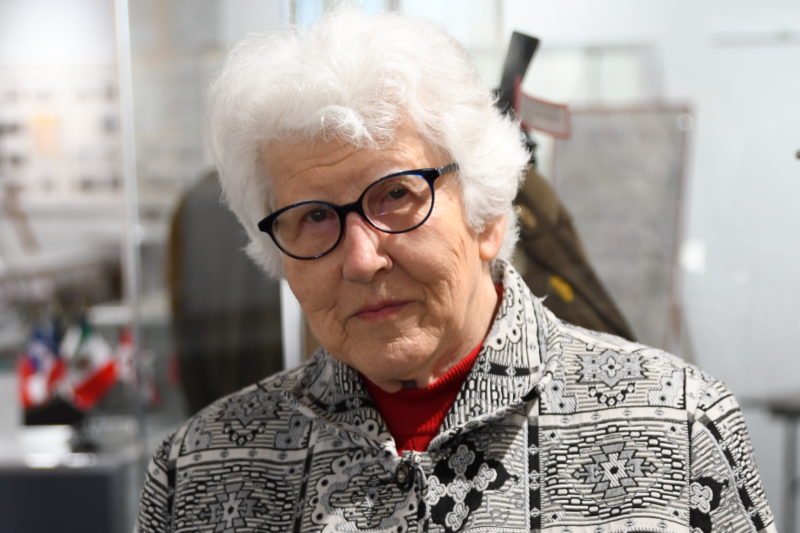
Caroline Moody. Hope Lenamon/Reporting Texas
“Closed Until Further Notice” reads a sign on the entrance to the Don Freeman Memorial Museum on Eden’s main square. That also means the coronavirus has confined curator Carolyn Moody, 84, to her home, making it impossible to travel the state to gather materials for a new exhibit on Lightner, a nearby stop on the old Forth Worth and Rio Grande Railway.
Moody helped open the museum in 2003 at the request of Lucille Freeman, who donated Eden’s old post office in memory of her husband, a local rancher. Since then, Moody, a history lover, has enthusiastically labored to tell the story of Concho County’s ranchers, townspeople and war heroes.
Today’s pandemic, however, has her stuck squarely in the present.
“It’s getting a little claustrophobic,” said Moody, who lives alone since her husband passed in 2016. Her movements are limited to picking up call-in orders at the City Limits Cafe, buying groceries at Family Dollar, or checking her mailbox at the Post Office. Eden residents have been good about keeping to social-distancing guidelines, she says, but she only stays out long enough to get what she needs.
Moody grew up in Eden but left to study music and then elementary education. After she graduated from Texas Tech, in 1953, she married Wendell Bruce Moody. The couple lived in various posts around the country for her husband’s work with the Soil Conservation Service, a federal agency now called the National Resources Conservation Service, and Moody taught school.
Life under a pandemic is unlike anything she’s experienced since moving back to town. “We haven’t had anything like this since World War II,” Moody said.
One of six children, she grew up during the war, when gasoline rationing meant people mostly went places within walking distance and food rations limited choices in stores.
“It was confining,” Moody said. “But it wasn’t as bad as it is now.” Back then, you could at least socialize with your neighbors. Today, like many Texans under stay-at-home orders, she mostly keeps to herself, killing time by solving crosswords and other puzzles.
Speaking historically, the curator said: “It was a wider circle as far as the individual was concerned” in World War II days. “But now we’re confined to our homes, and that’s a smaller circle for the individual.”
In the meantime, Moody is trying to think of ways to bring more visitors to the museum. “These people that are living now, they just aren’t that interested in history,” she said.
-Cat DeLaura
Matt Odom, principal, Eden High School
Published April 15.
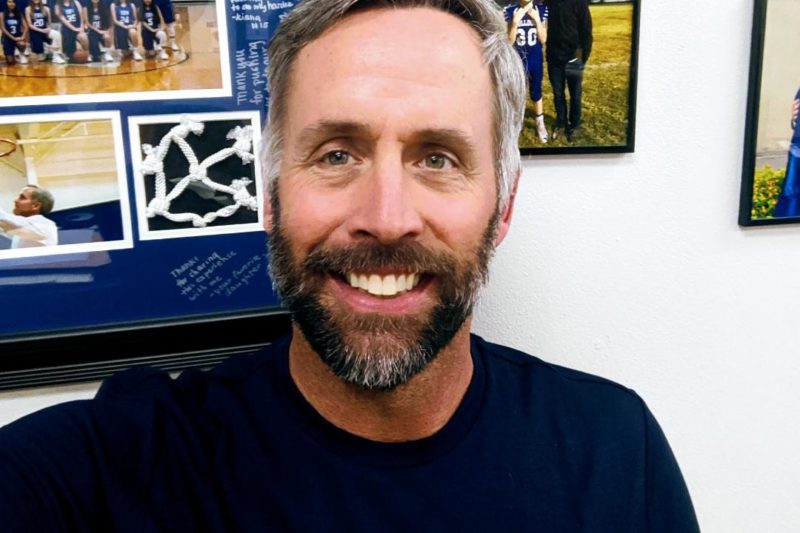
Matt Odom. Courtesy Matt Odom.
For Matt Odom, principal of Eden Middle School and Eden High School, preparations for how COVID-19 would change students’ classroom experience began when the district made a decision to extend spring break.
During that extension, Odom, 46, met with teachers to plan for the possibility of moving classes to a distanced-learning format. “I gave them a list of things that needed to get done, and they knocked it out of the park,” he said.
While teachers gathered materials for work-from-home packets, the district worked with West Central Wireless to secure internet access for students without it. On March 23, students came to school to pick up packets for the week, and those who needed an internet router or laptop were able to pick them up, too. By March 27, teachers had posted assignments to Google Classroom and started contacting students using the communication app Remind.
The district planned to offer breakfast and lunch to all students under 18. After two weeks, Eden Consolidated Independent School District had served nearly 2,000 meals.
“The unsung heroes, truthfully, are those cafeteria people,” Odom said.
Shay Avants, the school’s special education director and athletic director, also worked hard to insure all students get the accommodations they need, Odom said.
In a survey sent to gauge how the district was meeting the community’s needs, parents and students gave overwhelmingly positive responses, Odom said.
Odom said he spent a day reaching out to talk to seniors about how they were coping with the changes. “Out of the 11 seniors I talked to, their biggest concern, it wasn’t prom,” Odom said. “What they are concerned about is graduation.”
He said many of the students became emotional talking about the possibility of missing graduation. “We’re going to figure out something for those youngsters, because it is a milestone,” Odom said.
-Hope Lenamon
Tanya Garcia, librarian, Eden Public Library
Published April 15.

Tanya Garcia. Courtesy Tanya Garcia.
In normal times, Tanya Garcia oversees Eden’s public library, one of the town’s liveliest hubs. It offers everything from Easter-egg hunts and free income tax advice to books, computers and internet access.
Normally, Garcia, 46, can be found behind the main desk sorting through boxes of donated books, coordinating reading events with local schools or helping parents fetch their children from the cozy and colorful reading room.
But normal abruptly ended on April 3, Garcia said, when the library closed its doors in line with Gov. Greg Abbott’s order to shutter all nonessential businesses in Texas in response to the spread of COVID-19.
Garcia, an Eden native, started volunteering for the library a decade ago and was eventually hired as the facility’s full-time librarian.
She missed the recent stay-at-home closing of the library, because she has been quarantined at home since March 16. Garcia suffers from multiple sclerosis, making her more vulnerable to the coronavirus.
Her boss, the chairman of the library board, kept the library going by taking over Garcia’s shift as Eden’s young people came by after the city’s schools shut down to use the internet for distance learning.
“I had gotten the notice, maybe a couple weeks after the pandemic hit, from the doctor, saying not to go out, not to be in public places unless it was an emergency,” she said.
Even with nonessential businesses closed, Garcia said there isn’t an overwhelming concern the virus will spread to Eden. Meanwhile, she is looking forward to getting back to work, despite not knowing how long it will take for things to return to normal.
But she’s seen the town bounce back from disasters before.
“I don’t know if it’s a Texas thing, or if it’s just Eden, but we’re pretty resilient,” Garcia said. “I think we’re going to be OK.”
-Nataleah Small
Paula Duwe, owner, Schumann’s clothing store
Published April 13.
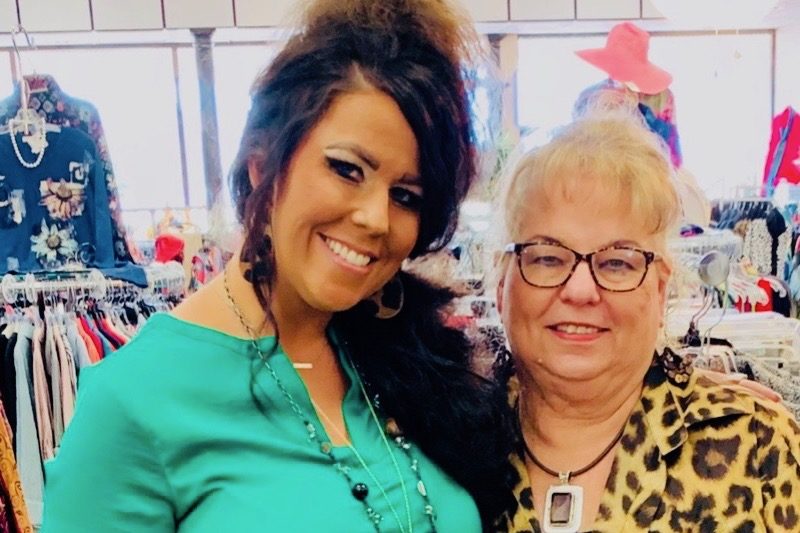
Sarah and Paula Duwe. Courtesy Paula Duwe.
Paula Duwe’s business acumen and entrepreneurial aptitude over the decades earned her the Governor’s Small Business Award in 2016. But the reality of 2020 is proving to be an entirely different challenge than any other she’s faced.
“I’m 70, so I’ve seen a lot in my day,” she said, “but this is different.”
Eden-born and raised, Duwe is the owner of Schumann’s, an upscale women’s clothing and accessory boutique and the town’s longest-running business. Started by Duwe’s mother in 1967, Schumann’s is an intergenerational example of small business success.
The pandemic has brought sweeping change to the rhythms and routines of small-town life, and even an established business such as Schumann’s is feeling the effects. In the pre-pandemic world, Duwe greeted customers by name, helped pick out outfits and caught up on local news. Now, she’s running a business in a socially distanced world.
“We have to take precaution,” Duwe said, “because if we don’t, these businesses that are closed for weeks or a month may be closed indefinitely.”
Duwe took what she calls the “common sense approach” of closing Schumann’s doors almost three weeks ago. “We closed on our own prior to the mandate from the governor because we love our customers and we need to take care of ourselves,” she said.
So far, the store has successfully pivoted to online orders. With an active Facebook presence, Schumann’s continues to sell mail order items, and customers can swing by the entrance for item pick up by appointment, Duwe said. The boutique’s sole employee is no longer working, but Duwe’s daughter Sarah, who runs Schumann’s now-closed second location in San Angelo, is assisting her mother in Eden.
Some members of what Duwe calls their “amazing customer base” are buying gift certificates, redeemable once Schumann’s reopens. “They know that cash flow is important for us as a small business,” she said, and putting money in the company’s hands now is going to help them ride this out. Although they are financially stable, Duwe is expecting having to look into small business loans.
For Duwe, the struggle is also personal. One of her daughters is the chief nursing officer at a hospital in Kyle, and last week she came into contact with a colleague who tested positive for COVID-19.
“It’s real,” Duwe said. “This is my family. It’s not a hoax. The main thing is we’ve got to get our people well, and we’ve got to get this virus under control.”
—Aimée Knight
Brian Lady, CEO, Concho County Hospital
Published April 9.
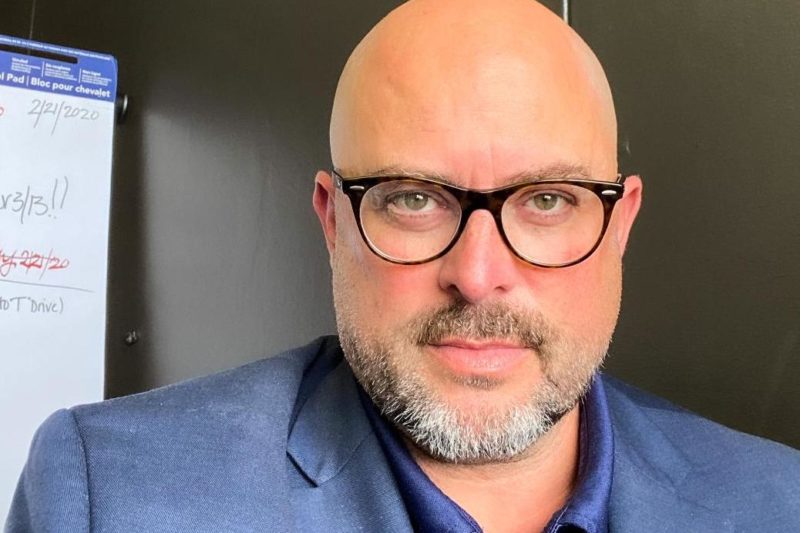
Brian Lady. Courtesy Brian Lady.
Eden has yet to record a single case of COVID-19 as of April 7, but Brian Lady and his team at Concho County Hospital are working overtime to prepare nonetheless.
Three hours after Gov. Greg Abbott declared a state of emergency on March 13, Lady, the hospital’s CEO, locked down the 16-bed facility but for patients admitted through the emergency room entrance.
“The reason I did that was not to be the first,” said Lady, 53, “but because I don’t have any staff to back me up if there is an outbreak.”
Concho County is a critical access hospital that provides essential health services to Concho and adjacent counties. It has 58 full-time employees, two-thirds of whom are medical personnel, and Lady worries it could be quickly paralyzed in a COVID-19 crisis.
Lady, a 23-year health care veteran, has learned from painful experience. In 2009, he was working in South Texas near the U.S.-Mexico border when the swine-flu pandemic hit and an influx of infected patients from Mexico overwhelmed his hospital and its staff. The lesson stuck.
“It’s kind of like the Sword of Damocles,” he said. “You don’t know when you’re going to get hit, and sometimes the unknown is just as daunting as the known.”
That’s why Lady makes protecting his staff at Concho County his No. 1 priority. Lady said his hospital has been able to restock surgical masks, protective equipment and other resources, but he doesn’t have the luxury of replacing essential staff members if they fall ill or have to go into quarantine. Precautions include treating everyone who enters as if they are potential COVID-19 carriers.
Concho County’s staff is “my most valuable resource,” Lady said: “We are the only ones who can help protect the patients, do screenings and educate the public.”
— Tyler Lewis
Marlinda Davis, owner, Zen Body Care and Boutique
Published April 7.
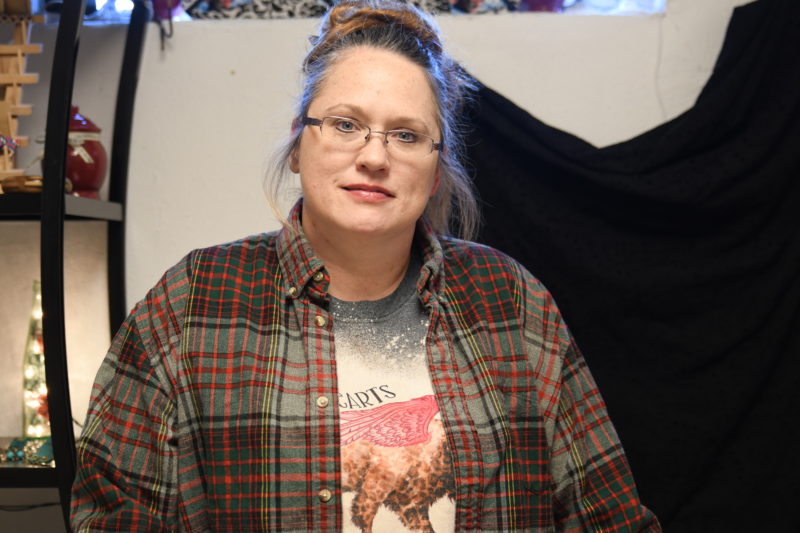
Marlinda Davis. Hope Lenamon/Reporting Texas
Zen Body Care and Boutique, a small wellness and clothing business, is located just off Eden’s central square. According to owner Marlinda Davis, the business had – until recently – been growing.
The business expanded from its massage and facial services by opening a women’s clothing section in October and was gearing up to add children’s clothes to its racks by the end of March, Davis said. Her plans – like many people’s the world over – have been derailed by the coronavirus.
On March 31, Gov. Greg Abbott issued an order that closed most businesses and
required Texans to stay at home except for a few “essential activities,” including going to the grocery store and doctor’s office. Davis was forced to shutter Zen Body Care and Boutique’s doors to comply with the order. As a result, she said she is struggling to stay afloat and reckoning with what a post-pandemic world might mean for her enterprise.
“I have a feeling that, unfortunately, even once this is all said in done, there’s going to be months of damage,” Davis said. “I’m not going to be financially back to where we were before this happened.”
Davis has been trying to file for unemployment benefits, but she keeps getting caught up in administrative bottlenecks, she said. The unemployment benefits website directs her to a phone number, but when she calls the number, it directs her back to the website. It’s a frustrating situation, she said.
“There’s nothing I can do right now to pay my bills,” Davis said. Once she can reopen her doors, she’s not convinced the outlook favors her services. “A lot of people will have lost their jobs and suffered financially,” Davis said, “so it’s not like they’re going to go get a facial or get a massage.”
— Aimée Knight
A.J. Dolle, publisher, The Eden Echo
Published April 7.
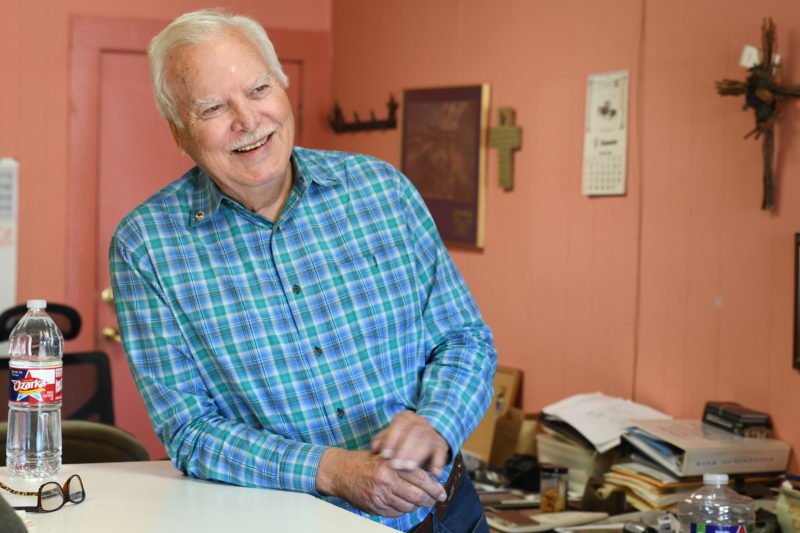
A.J. Dolle. Hope Lenamon/Reporting Texas
On the front page of every edition of The Eden Echo are the words “In God We Trust” followed by the price for the weekly newspaper, 75 cents. The words are less of a nod to times past and more of a reminder of the way things have always been.
A.J. Dolle, 77, has been the owner and publisher of the paper since 2008. The newspaper is headquartered in a building on the town’s central square. On any given day, one of the women who runs the museum may come to the newspaper to pay a bill, and a former mayor may drop by to chat.
Since social distancing guidelines have been enacted, things are slow at the paper’s headquarters. But there is still news to print, Dolle said.
Dolle is working to keep the community informed about the pandemic, and he is also making sure to stay up to date on the wind turbines being installed in the area.
Dolle has seen little concern about the coronavirus in Eden, but social distancing has been hard for him. “The only place you run into more than a couple of people is at the store,” he said. “There are no church services, no Lions meetings, no club meetings, no organizational meetings.”
“I’m just used to hugging on people,” Dolle added. “And to have to stay away six feet, you can’t even bump elbows anymore.”
— Nataleah Small
Nneka Papillion, medical director, Concho County Hospital
Published April 7.
Dr. Nneka Papillion, a 35-year-old Dallas native, graduated from medical school in the Dominican Republic in 2013. She completed residency training at the University of Arkansas for Medical Sciences, where she served as chief resident, in 2019. Now, she is leading a rural hospital in its fight against the COVID-19 pandemic.
Papillion, chief of staff and medical director at Concho County Hospital in Eden, says her training has prepared her to cope not only with the coronavirus but also the challenges of caring for patients in rural Texas. “As a small town we have limited resources, and so we always have to be proactive rather than reactive,” Papillion said.

Dr. Nneka Papillion. Courtesy Nneka Papillion.
The 16-bed facility provides essential services to Eden, Concho County and neighboring counties without hospitals. Papillion, one of two physicians, began working at the hospital in January. She oversees a small staff that during any given shift includes a charge nurse, a licensed vocational nurse and a nurse assistant. Unlike larger hospitals, where people have specific jobs, the staff at Concho County play multiple roles.pTo prepare for the impact of COVID-19, the hospital preemptively closed its doors on March 13 except for its emergency room entrance. Before coming inside, anyone, patient or staff, must go through a screening process which includes checking temperatures and putting on masks.
Anyone visiting the ER with respiratory symptoms, Papillion said, is placed in a negative pressure room, where air pressure is kept low to prevent the spread of contaminated air. The patient stays in this area until their COVID-19 test results come back. So far, no one has tested positive.
Papillion worries the larger hospitals that typically take her transfer patients could run out of room. And that could spell trouble for Eden. Concho County has no long-term ventilators — those the hospital does have are only meant to be used long enough to transport a patient to a bigger facility.
“Our purpose is just to stabilize people and get them to a higher level of care,” Papillion said. “So, if that higher level of care gets overwhelmed, these patients are stuck at our hospital, and we don’t really have the capabilities of ICU care.”
Should critical cases come, Papillion added, “we will do what we can to stabilize them and get them where they need to be or whatever we need to do.”
— Hope Lenamon
Steve Belote, pastor, Hallelujah Trail Cowboy Church
Published April 7.
Eden’s churches have had to adjust to the new norm of social distancing. For Hallelujah Trail Cowboy Church, located just outside the city limits, that means having only a small group gather on Sundays to broadcast the church service to congregants via Facebook live.
As isolation measures have increased, the church has faced increasing financial difficulties, Pastor Steve Belote said. “Our tithing and our offerings are way down, and we’re not going to get no relief check or anything.”
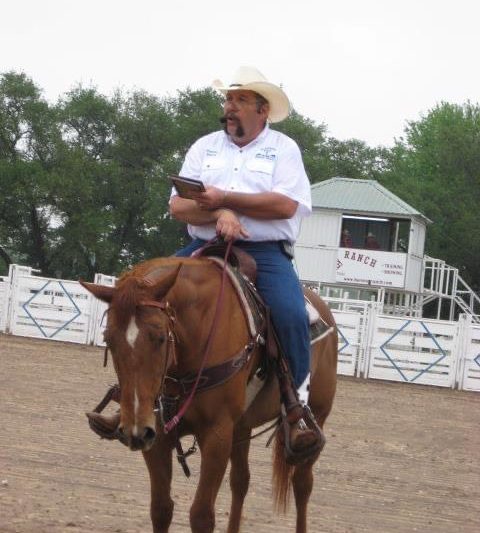
Steve Belote. Courtesy Facebook.
Belote, 60, is also frustrated with the way social distancing measures have changed the small town.
“We understand it’s a bad disease,” Belote said, “but still I feel personally it was blown out of proportion quite a bit, and it put a lot of fear in people that probably didn’t need to be in fear.”
Since the pandemic hit, people eye each other suspiciously on the streets, Belote said. “God made us to be together,” he added, “and when you shut people up, and put everyone in a house, it’s frustrating. After a while you need other contact, you need that fellowship.”
Belote said he is planning on holding an Easter service next week, albeit a bit of an unusual one where he will preach from the back of a trailer in the church parking lot and congregants will remain in their cars to practice social distancing.
“We’re not going to do our normal Easter service,” he said, where he usually preaches from horseback and the entire congregation shares a meal afterward. “We are going to have a short service,” Belote said, “It has to be on Easter. You got to have a service.”
— Cat DeLaura
